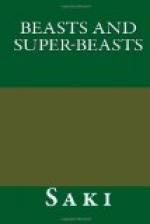Of all the genuine Bohemians who strayed from time to time into the would-be Bohemian circle of the Restaurant Nuremberg, Owl Street, Soho, none was more interesting and more elusive than Gebhard Knopfschrank. He had no friends, and though he treated all the restaurant frequenters as acquaintances he never seemed to wish to carry the acquaintanceship beyond the door that led into Owl Street and the outer world. He dealt with them all rather as a market woman might deal with chance passers-by, exhibiting her wares and chattering about the weather and the slackness of business, occasionally about rheumatism, but never showing a desire to penetrate into their daily lives or to dissect their ambitions.
He was understood to belong to a family of peasant farmers, somewhere in Pomerania; some two years ago, according to all that was known of him, he had abandoned the labours and responsibilities of swine tending and goose rearing to try his fortune as an artist in London.
“Why London and not Paris or Munich?” he had been asked by the curious.
Well, there was a ship that left Stolpmunde for London twice a month, that carried few passengers, but carried them cheaply; the railway fares to Munich or Paris were not cheap. Thus it was that he came to select London as the scene of his great adventure.
The question that had long and seriously agitated the frequenters of the Nuremberg was whether this goose-boy migrant was really a soul-driven genius, spreading his wings to the light, or merely an enterprising young man who fancied he could paint and was pardonably anxious to escape from the monotony of rye bread diet and the sandy, swine-bestrewn plains of Pomerania. There was reasonable ground for doubt and caution; the artistic groups that foregathered at the little restaurant contained so many young women with short hair and so many young men with long hair, who supposed themselves to be abnormally gifted in the domain of music, poetry, painting, or stagecraft, with little or nothing to support the supposition, that a self-announced genius of any sort in their midst was inevitably suspect. On the other hand, there was the ever-imminent danger of entertaining, and snubbing, an angel unawares. There had been the lamentable case of Sledonti, the dramatic poet, who had been belittled and cold-shouldered in the Owl Street hall of judgment, and had been afterwards hailed as a master singer by the Grand Duke Constantine Constantinovitch—“the most educated of the Romanoffs,” according to Sylvia Strubble, who spoke rather as one who knew every individual member of the Russian imperial family; as a matter of fact, she knew a newspaper correspondent, a young man who ate bortsch with the air of having invented it. Sledonti’s “Poems of Death and Passion” were now being sold by the thousand in seven European languages, and were about to be translated into Syrian, a circumstance which made the discerning critics of the Nuremberg rather shy of maturing their future judgments too rapidly and too irrevocably.




